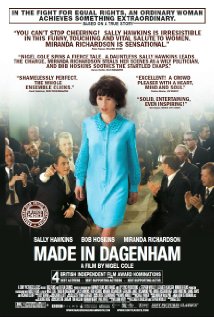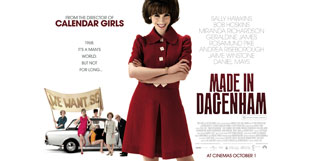Background to the Story
When women machinists at Ford's Dagenham factory downed tools in 1968 in protest at the fact that they were classed as unskilled workers, while male colleagues doing the same job were thought to be skilled and paid much more for their efforts, they couldn't have imagined the ramifications.
Strike action
The strike began on 7 June 1968, when around 850 women sewing machinists at Ford Motor Company Limited's Dagenham assembly plant in Essex walked out, followed later by the machinists at Ford's Halewood Body & Assembly plant. The women made car seat covers, and, as stock ran out, the strike eventually resulted in a halt to all car production.
The Dagenham sewing machinists walked out when, as part of a regrading exercise, they were informed that their jobs were to be downgraded from skill Category C (semi-skilled) to skill Category B (unskilled), and that they would be paid 15% less than the full B rate received by men. At the time it was common practice for companies to pay women less than men, irrespective of the skills involved.
Following the intervention of Barbara Castle, the Secretary of State for Employment and Productivity in Harold Wilson's government, the strike ended after three weeks, as a result of a deal that immediately increased the women machinists' rate of pay to 8% below that of men, rising to the full category B rate the following year. A court of inquiry, under the Industrial Courts Act 1919, was also set up to consider their regrading, although this failed to find in their favour. The women were only regraded into Category C following a further 6 week strike in 1984.
Impact
The strike was, however, to have an enduring legacy. Spurred on by their example, women trades unionists founded the National Joint Action Campaign Committee for Women’s Equal Rights (NJACCWER), which held an 'equal pay demonstration' attended by 1,000 people in Trafalgar Square on 18 May, 1969.
The ultimate result was the passing of the Equal Pay Act 1970, which came into force in 1975, and which did, for the first time, aim to prohibit inequality of treatment between men and women in terms of pay and conditions of employment. In the second reading debate of the bill, the machinists were cited by MP Shirley Summerskill as playing a "very significant part in the history of the struggle for equal pay". Once the UK joined the European Union in 1973, it also became subject to Article 119 of the 1957 Treaty of Rome, which specified that men and women should receive equal pay for equal work.
Film Credits
Directed by Nigel Cole (Calendar Girls, 2003) Screenplay by William Ivory |
Cast: Sally
Hawkins |
 |
